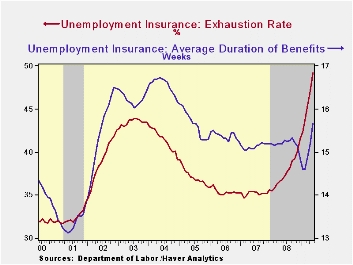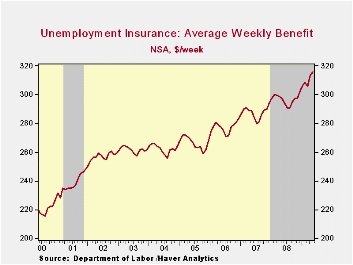 Global| Jul 09 2009
Global| Jul 09 2009U.S. Pays $8 Billion In Unemployment Benefits
by:Tom Moeller
|in:Economy in Brief
Summary
The current recession started over eighteen months ago and roughly eight billion dollars are being paid each month in unemployment benefits under state programs. For the jobless who have exhausted their unemployment benefits, recent [...]

The current recession started over eighteen months ago and roughly eight billion dollars are being paid each month in unemployment benefits under state programs. For the jobless who have exhausted their unemployment benefits, recent discussion in Washington of extending the duration of benefits may come too late. For those receiving benefits, the news is welcome in this tough job environment. Data in Haver's USECON database focuses on the magnitude of the labor market difficulties, not only by dollars paid and the duration of unemployment but by which industries and states have been most affected.
The average duration of unemployment recently has been running 15.7 weeks. That is up by one full week from the beginning of the year and, given the severity of this recession, it likely will rise further. During the severe recessions of 1973-75 and 1981-82, the peaks in average duration were above 17 weeks. Notable this cycle has been the jump in the benefit exhaustion rate to a record 49.2%. (The exhaustion rate is the percent of claimants who collect all of their unemployment.) Past cycle highs were nearer to 40%. As this recession has now lasted so long, the higher rate is no surprise. The states with the higher benefit exhaustion rates include New Jersey (57.3%), California (55.5%), Massachusetts (48.8%) and New York (46.5%). (These figures are available in Haver's REGIONAL database.)
Also under current discussion is raising the level of weekly dollars paid in insurance. The current average of $315.71 is up 6.2% from last year and up from an average $212.13 ten years ago. Adjusted for inflation using the CPI, benefits have risen 18% over those ten years helped by the recent decline in oil prices.
The industry breakout of continued unemployment claims indicates that roughly one-third of all continuing unemployment insurance benefits are being collected by workers in the manufacturing (20.3%) and construction (13.6%) industries. The factory sector's share of all claims being paid is up to 20% from 13% early last year. The administration & support sectors follow with 10.0% of workers collecting, but that rate has been stable since 2005. The retail trade sector follows with a steady 8.0% collecting while 5.4% of workers in the professional/scientific and tech services area collect. Surprisingly, perhaps, workers in the health care & social services industry account for 4.7% of those collecting, but that is down from an 8.0% 2007 peak. Finally, 3.0% of workers in the finance & insurance industries collect but that is down from a 4.8% share late in 2007.
The elasticity of the unemployment rate with respect to benefits from the Federal Reserve Bank of Philadelphia can be found here.
| Unemployment Insurance Benefits | May | April | May '08 | 2008 | 2007 | 2006 |
|---|---|---|---|---|---|---|
| Average Duration (Weeks) | 15.68 | 15.21 | 15.18 | 15.19 | 15.14 | 15.38 |
| Exhaustion Rate (%) | 49.23 | 47.06 | 36.80 | 37.84 | 35.22 | 35.42 |
Tom Moeller
AuthorMore in Author Profile »Prior to joining Haver Analytics in 2000, Mr. Moeller worked as the Economist at Chancellor Capital Management from 1985 to 1999. There, he developed comprehensive economic forecasts and interpreted economic data for equity and fixed income portfolio managers. Also at Chancellor, Mr. Moeller worked as an equity analyst and was responsible for researching and rating companies in the economically sensitive automobile and housing industries for investment in Chancellor’s equity portfolio. Prior to joining Chancellor, Mr. Moeller was an Economist at Citibank from 1979 to 1984. He also analyzed pricing behavior in the metals industry for the Council on Wage and Price Stability in Washington, D.C. In 1999, Mr. Moeller received the award for most accurate forecast from the Forecasters' Club of New York. From 1990 to 1992 he was President of the New York Association for Business Economists. Mr. Moeller earned an M.B.A. in Finance from Fordham University, where he graduated in 1987. He holds a Bachelor of Arts in Economics from George Washington University.
More Economy in Brief
 Global| Feb 05 2026
Global| Feb 05 2026Charts of the Week: Balanced Policy, Resilient Data and AI Narratives
by:Andrew Cates






